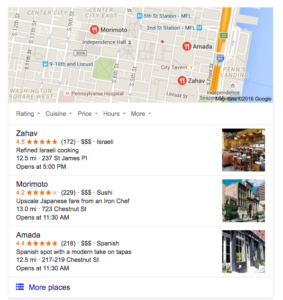Almost two years ago, Google launched a new algorithm dubbed “Pigeon” to provide more useful, relevant and accurate local search results. Before Pigeon, queries on the Google Search Engine provided results that were much different than searches on the Google Maps platform. The new algorithm aimed to connect web and map searches more cohesively and in turn, tie local results more closely to standard web ranking signals. So what does all of this mean for small businesses?
Local SEO matters and its impact on the search engine results page (SERP) will continue to get stronger.
Google has a thing for local businesses. Why? Because Google wants to give people what they want, when they want it, as efficiently as possible. Consider the three strategies below to ensure you are being found locally.
Google My Business
Claiming your company profiles is a crucial part to ranking locally. Depending on the industry your business is in, this could mean a variety of different profiles. Regardless of what you do, there is one thing you cannot ignore: Google My Business. Arguably the most important step you can take is claiming your Google My Business page. Spend time updating, optimizing and adding important information your Google My Business Page. Include relevant pictures and text. If you forget about everything else, do not forget about this!
Local Directories
In 2014, Google found that 50% of consumers who conducted a local search visited a store within a day. Your business can be found on many other local platforms. Review sites like Yelp, TripAdivsor and Yahoo! Local Listings, are examples of other places where potential customers may go to find you. There are also industry specific listings like Avvo, which is an online legal services marketplace. Avvo makes sense if you are an attorney, but if you are a restaurant owner, Urbanspoon would be a better fit.
Before you go on a local listing optimization rampage, have a strategy. Just throwing together as many profiles as possible could hurt you if you’re not consistent. Choose the right platforms, include accurate name, phone and address information and upload high quality images. Consistency is so important here. The more complete and accurate each profile is, the greater your chances of ranking higher becomes.
Local Reviews
The importance of local reviews cannot be said enough. In 2015, BrightLocal conducted a Local Consumer Review Summary and shared “key takeaways” from the research. Here are the top 3:
- 92% of consumers now read online reviews
- 40% of consumers form an opinion by reading just 1-3 reviews
- Star rating is the #1 factor used by consumers to judge a business
It is evident that more and more users rely on search results to give them the answers they need. A search of “restaurants in Philadelphia” yielded us these results:
What you will notice is that the best organic listings are taken by the restaurants with good reviews. As you scroll further down, you will notices that the next organic listings are largely from Yelp (and a few others from Zagat, OpenTable and Visit Philly). Reviews matter because they tell Google about the relevance and quality of your business and help to increase search visibility.
Star factor seems to be one of the biggest factors consumers pay attention to, probably due to its visual impact. The only way to get more reviews and the better potential for higher star ratings is to ask. We will dive into the how-to’s of getting reviews next week – stay tuned!
Conclusion
Local SEO is not a quick fix. Optimizing Google My Business, claiming local listings and acquiring reviews all take time. If you want to rise to the top of your local SERP (Search Engine Results Page), these three strategies will prove to be extremely effective.
If you want to dive deeper and have questions on how you can start now, feel free to contact us!


